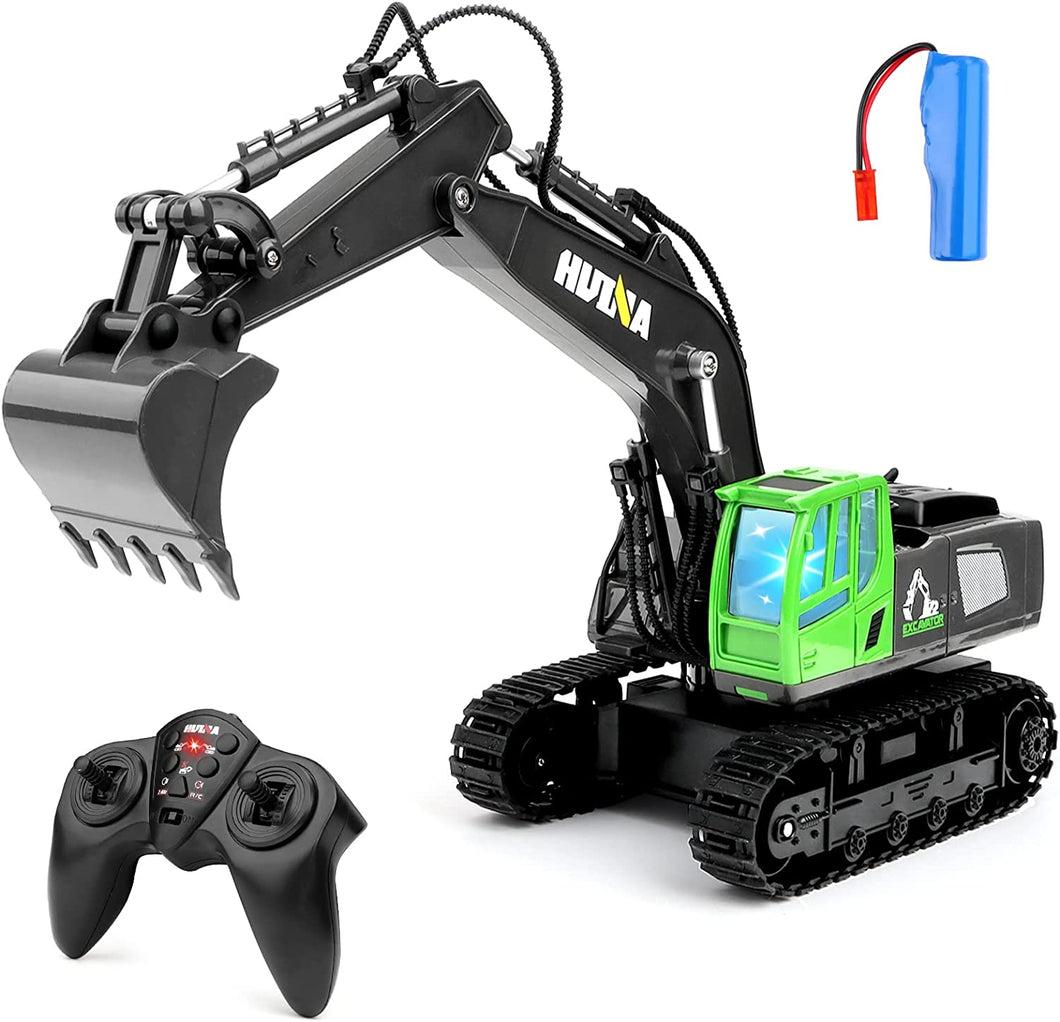5 Surprising Benefits of Integrating a rc excavator into Your Construction Process
Wiki Article
Discover the Importance of Excavator in Modern Building And Construction Projects
Excavators are crucial tools in modern building tasks. Their versatility allows them to execute a large range of tasks, from excavating and grading to demolition and website preparation. Advanced features, such as hydraulic accessories and general practitioners, enhance their capabilities and efficiency on task websites. As the industry advances, the importance of excavators expands a lot more. Understanding their function can reveal understandings right into the future of building and construction methods. What exists in advance for these equipments?The Flexibility of Excavators in Different Projects
Excavators are commonly linked with large construction tasks, their versatility allows them to be used in a large variety of applications, from residential landscape design to energy maintenance. In city settings, excavators can browse limited rooms to dig foundations for homes or set up water drainage systems. Their capability to execute delicate tasks makes them suitable for landscape design projects, where they can dig deep into for ponds or plant trees. On top of that, excavators play an important duty in utility upkeep, efficiently digging trenches for pipes or cables without disrupting bordering locations. In farming applications, they help in land cleaning and soil preparation. Their versatility allows them to be outfitted with numerous accessories, boosting their capability throughout various tasks. This complex nature of excavators not just enhances different building and construction processes yet additionally demonstrates their integral duty in contemporary facilities advancement and upkeep.Key Attributes and Sorts Of Excavators
The conversation on key attributes and kinds of excavators highlights the necessary qualities that make these equipments very useful in construction. Different excavator types, each created for particular jobs, demonstrate their adaptability and performance throughout various applications. rc excavator. Comprehending these classifications and functions is essential for enhancing their use in modern building projectsExcavator Enters Overview
Excavators play a critical duty in modern-day construction, supplying flexibility and efficiency across numerous jobs. These heavy machinery devices been available in numerous types, each customized for particular applications. The most common types consist of spider excavators, understood for their stability on uneven terrain, and rolled excavators, which provide better flexibility on paved surfaces. Tiny excavators are favored for tight areas and small projects, while long-reach excavators are developed for deep excavating. Furthermore, there are specific excavators, such as hydraulic excavators, which improve power and accuracy. Each type includes unique capacities, making them crucial for tasks varying from digging and grading to demolition and product handling. Comprehending these variations enables building and construction professionals to select the right excavator for their task requires.Secret Includes Explained
Understanding the essential functions of excavators enhances their efficient application in construction tasks. Excavators are identified by their effective hydraulic systems, which give the required force for excavating, training, and relocating products. Their articulated arms permit a vast array of motion, facilitating exact operations in constrained rooms. Additionally, the range of add-ons, such as buckets, grapples, and augers, increases their flexibility to fulfill different task demands. The size and weight of excavators also contribute to their stability and maneuverability on numerous surfaces. Moreover, developments in modern technology have brought about the assimilation of GPS and automation, improving accuracy and performance in excavation tasks. These functions jointly position excavators as vital tools in modern-day building and construction.Applications in Building and construction
Changing construction websites, excavators play a crucial function across different applications, ranging from domestic structure jobs to massive infrastructure growths. These versatile equipments are geared up for jobs such as excavating structures, trenching for utilities, and website grading. Different kinds of excavators, consisting of spider, rolled, and mini excavators, provide particular advantages tailored to the job needs. Crawler excavators stand out in harsh terrains, while wheeled excavators supply wheelchair on smooth surface areas. Mini excavators are optimal for restricted areas, making them prominent in city setups. The efficiency and power of excavators considerably accelerate building processes, making certain timely job conclusion. Their adaptability even more boosts their relevance, allowing building and construction teams to tackle a varied range of obstacles effectively.Enhancing Effectiveness and Productivity on Job Sites
Optimizing effectiveness and efficiency on job websites is a vital goal in modern building. Excavators play a crucial role in accomplishing this objective by enhancing different tasks. Their capacity to perform numerous functions-- such as lifting, digging, and grading-- decreases the demand for extra devices, consequently saving time and resources.Moreover, excavators improve workflow by enabling faster conclusion of tasks. With advanced features like hydraulic accessories and GPS technology, they can implement precise operations that decrease mistakes and revamp. This accuracy not just enhances the top quality of work yet also maximizes material usage, adding to set you back savings.The adaptability of excavators enables them to adapt to various site problems, guaranteeing that projects progress smoothly no matter of difficulties. By incorporating excavators into building and construction procedures, teams can considerably increase their overall performance, causing prompt job completion and enhanced earnings.Safety Advantages of Making Use Of Excavators
Excavators considerably boost security on building and construction sites with boosted driver presence and reduced manual work dangers. By supplying operators with a clear view of their environments, excavators assist to protect against injuries and accidents. Furthermore, the machinery lessens the need for workers to take part in unsafe hands-on tasks, further promoting a more secure work atmosphere.Enhanced Operator Presence
Construction websites can be chaotic and loaded with prospective risks, enhanced driver visibility plays a crucial role in guaranteeing safety and security when utilizing excavators. Modern excavators are developed with large, unobstructed windows and strategically put mirrors, enabling drivers to maintain a clear sight of their environments (rc excavator). This boosted exposure is crucial for detecting pedestrians, other machinery, and numerous obstacles, considerably lowering the risk of accidents. Additionally, several excavators integrate advanced technology, such as cameras and sensing units, to supply operators with added viewpoints, further enhancing recognition. The capacity to see even more plainly not just help in efficient procedure but also fosters a safer workplace, making it less complicated for drivers to navigate complicated construction websites without endangering safety and security standardsDecreased Manual Work Risks
When hand-operated labor is minimized via the usage of excavators, numerous security advantages arise, considerably improving the wellness of building workers. Excavators minimize the physical stress associated with hefty training and repeated jobs, efficiently reducing the danger of bone and joint injuries. By automating procedures such as digging, grading, and moving products, they enable employees to keep a more secure distance from possible dangers. Furthermore, excavators are furnished with innovative safety attributes, such as rollover security systems and enhanced operator ergonomics, which better secure workers on site. The outcome is a considerable decrease in work environment crashes and injuries, resulting in raised performance and spirits amongst building teams. Eventually, the adoption of excavators adds to a safer and much more reliable building environment.Excavators in Earthmoving and Website Preparation
In modern-day building, a considerable portion of earthmoving and website preparation jobs relies upon the effectiveness and versatility of excavators. These machines are created to deal with various soil kinds and terrain, making them vital for grading, excavating, and trenching tasks. Their hydraulic arms can be equipped with various attachments, such as augers and containers, allowing operators to customize their approach based on details job requirements.Excavators excel at relocating large quantities of planet promptly and successfully, article source which speeds up the general construction timeline. They can browse limited spaces and challenging sites where traditional tools may have a hard time, boosting efficiency. In addition, the accuracy of excavators assurances that site preparation abides by strict specs, reducing the risk of errors that might result in expensive rework.The Duty of Excavators in Demolition Tasks
Excavators play an important role in demolition jobs, as they have the power and agility required to take apart frameworks successfully. Outfitted with numerous attachments such as hydraulic breakers, shears, and grapples, these machines can adjust to various demolition demands, whether for small structures or big industrial sites. Their flexibility allows drivers to take on complicated tasks while preserving security and precision.In addition to their demolition abilities, excavators help with debris elimination, making certain that work websites remain orderly and safe. By breaking down structures right into workable pieces, they permit structured clearing and recycling of products, aligning with contemporary sustainability efforts.Moreover, excavators can access tight rooms and browse uneven surface, making them important in city demolition tasks. Overall, their durable design and multifunctionality make excavators a critical asset in the demolition phase of building and construction, contributing significantly to task timelines and performance.

Future Patterns in Excavator Technology and Usage
As the building market develops, improvements in excavator innovation are poised to transform their use and effectiveness noticeably. One considerable trend is the integration of automation and expert system, enabling excavators to operate with marginal human treatment. This shift will enhance accuracy in tasks such as grading and trenching, lowering human mistake and enhancing productivity.Additionally, the rise of hybrid and electric excavators is forming a more sustainable building and construction environment, reducing carbon discharges and fuel expenses. Enhanced telematics systems are additionally emerging, allowing real-time monitoring of device performance and maintenance demands, which can bring about much better functional efficiency and longer devices lifespan.Moreover, advancements in add-on innovation are increasing the versatility of excavators, permitting them to execute a more comprehensive variety of jobs. The combination of these trends shows a future where excavators are smarter, greener, and much more versatile, eventually improving building job dynamics.
Often Asked Questions
How Do Excavators Compare to Other Construction Machinery?
Excavators, identified by their flexibility and power, master digging and earthmoving contrasted to other machinery. Their capacity to carry out numerous tasks, consisting of lifting and demolition, makes them vital in building and construction projects, boosting overall efficiency.
What Is the Typical Life-span of an Excavator?
The ordinary life expectancy of an excavator commonly varies from 7,000 to 10,000 operating hours, depending upon maintenance, usage conditions, and version. Proper treatment can expand this life-span, guaranteeing peak performance throughout its operational years.Exactly How Are Excavators Preserved for Ideal Efficiency?
Excavators need normal upkeep for peak efficiency, including regular evaluations, fluid checks, filter substitutes, and prompt repairs. Applying a precautionary maintenance routine aids extend their lifespan and guarantees reliable operation hop over to here in different construction atmospheres.What Are the Costs Connected With Buying an excavator vs. leasing?
The costs associated with renting out versus buying an excavator differ considerably. Renting offers lower upfront costs yet can gather in time, while acquiring needs a significant preliminary financial investment, yet supplies long-lasting savings and possession possession benefits.What Training Is Required to Run an Excavator?
Operating an excavator needs specialized training, commonly including safety and security methods, machine operation techniques, and environmental recognition. Certification programs frequently mandate sensible experience, making it possible for operators to deal with numerous jobs efficiently while making sure conformity with industry laws. The most common types consist of crawler excavators, understood for their security on uneven surface, and wheeled excavators, which supply better mobility on paved surfaces. Small excavators are favored for limited areas like it and small jobs, while long-reach excavators are developed for deep excavating. Furthermore, there are specific excavators, such as hydraulic excavators, which enhance power and accuracy. Different kinds of excavators, consisting of crawler, rolled, and mini excavators, give particular advantages customized to the project demands. Crawler excavators stand out in harsh surfaces, while rolled excavators supply mobility on smooth surface areas.Report this wiki page